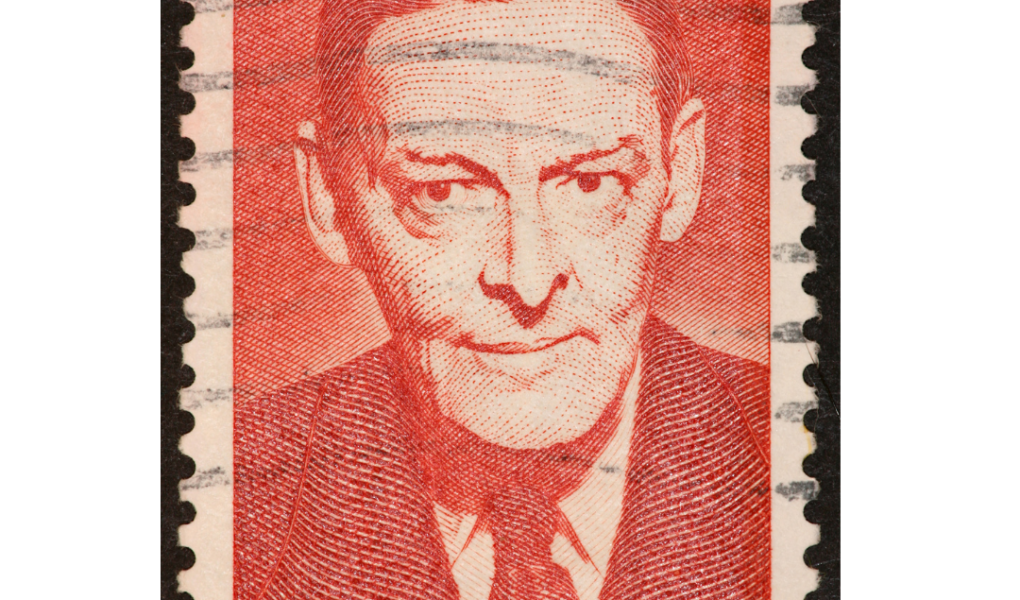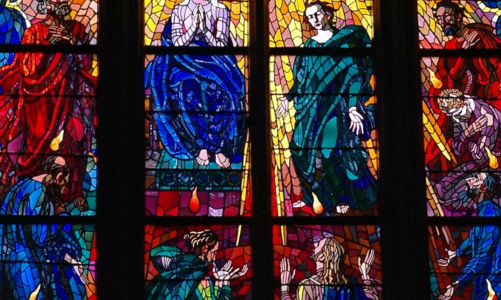Note: I’m honored to have people asking me when I’m going to post more writing. Unfortunately, after working 40+ hours a week and going to school fulltime, I need a break. I have so many things I want to write, but until I’m refreshed, I am going to post some of my papers written for college. This one in Dr. Sara Farris’ Online Poetry Class at UHD. It’s one of my favorites. Also, when I copy and paste papers into WordPress, the formatting becomes funky. I tried to correct it the best I can, but please be forgiving.
Thomas Sterns Eliot was an early twentieth century writer, most famous for his poetry’s ability to “reflect the complexity and confusion of modern culture” (Ryan, 1) by juxtaposing the traditional literature of the past with the modern meter and language innovations of his own day and age. While Eliot’s writing and poetry were awarded with the Noble Prize of Literature and the British Order of Merit, he was and still is a controversial figure, although most of the controversies surrounding Eliot are not about his writing. Scholars agree that his poems are remarkable and are worthy of the awards and recognition they received. Instead, the controversies involving Eliot concern and involve how he, at times, lived and acted against the Anglo-Catholic culture he believed in and wrote about. But if we look more closely at his writings and their themes of struggle and journey, such as those in “The Waste Land,” “The Hollow Men,” “Journey of the Magi,” and “Little Gidding,” we can see that his poems offer hope for those who vigorously tussle and fail to act according to their own beliefs. A careful reading of Eliot’s poems will show Eliot’s works are writings of humility, self-reflection, and hope for the enslaved sinner, offering a radical counter-cultural truth and influence on the often competitive “holier than thou” cliques sometimes found in religious groups.
Some of Eliot’s earlier poems such as, “The Waste Land” and “The Hollow Men” not only remind their reader of man’s inclination to sin, but they also remind those who believe in purgatory of God’s mercy toward the sinner even after his death. The Catechism of the Catholic Church defines purgatory as a place where:
All who die in God’s grace and friendship, but still imperfectly purified, are indeed assured of their eternal salvation; but after death they undergo purification, so as to achieve the holiness necessary to enter the joy of heaven” (Catechism of the Catholic Church. 1030).
For Eliot, who grew up with parents from “distinguished families of Puritan ancestry,” (Ryan 2) a religion known for its “moral rigor” and “fiercely intense religiosity” (Ryan 2), the Catholic Church’s recognition and mercy—even in death—towards humanity’s inclination to sin in life, along with the Puritan idea that one must be completely pure to enter Heaven, seems to have been a liberating perspective of reprieve for Eliot. He explores this idea before his conversion to Anglo-Catholicism briefly in his 1922 poem, “The Wasteland” and with more length in his 1925 poem “The Hollow Men.”
In “The Wasteland,” Eliot purposefully alludes to and references Saint Augustine’s Confessions, an autobiography that heavily focuses on the author’s inclination to sin and his journey into the religious life, “O Lord Thou pluckest me out/O Lord Thou pluckest me (The Waste Land ll. 308-310).” These verses in Eliot’s “The Waste Land,” come from chapter thirty-four of Saint Augustine’s Confessions where Saint Augustine is talking about his temptation to love worldly beauty more than God:
but Thou pluckest me out, O Lord, Thou pluckest me out; because Thy loving-kindness is before my eyes. For I am taken miserably, and Thou pluckest me out mercifully; sometimes not perceiving it, when I had but lightly lighted upon them; otherwhiles with pain, because I had stuck fast in them. (“St. Augustine: Confessions of Saint Augustine – Christian Classics Ethereal Library”).
This part of the poem in “The Waste Land,” read in context to Saint Augustine’s autobiography seems to focus on man’s inclination to sin and is acknowledging that it is only through God’s aid that man can be “plucked” out of his own will and into God’s divine will. It also acknowledges the pain and sacrifice required to obtain eternal happiness with God, “For I am taken miserably, and Thou pluckest me out mercifully” (“St. Augustine: Confessions of Saint Augustine – Christian Classics Ethereal Library”). While this section of “The Waste Land” focuses on man’s inclination to sin and God’s mercy to help own overcome sin in life, “The Hollow Men” takes this idea a step further, speaking of the idea of God’s mercy for the repentant sinner in the afterlife:
We are the hollow men…
Shape without form, shade without colour,
Paralysed force, gesture without motion;
Those who have crossed
With direct eyes, to death’s other Kingdom
Remember us—if at all—not as lost
Violent souls, but only
As the hollow men
The stuffed men (Hollow Men ll. 1, 11-18).
The idea that these men are “hollow” and “stuffed” implies that they are filled with the meaningless things of the world and are not yet filled with God. We know they are in the afterlife because they are bodiless, “shape without form, shade without colour/ Paralysed force, gesture without motion” (The Hollow Men ll. 11-12). Even though these hollow men are dead, we can assume they are in purgatory because they speak of crossing “to death’s other Kingdom” (The Hollow Men 14) and ask for those who have already crossed for prayers saying, “Remember us…” (The Hollow Men 15). Because these poems heavily focus on man’s inclination to sin, and because they are undoubtedly among his most famous poems, reaching vast audiences of many different religious beliefs, they call the reader to not only admit and reflect on their own faults, but also on the mercy of God. This is an idea that is radically humble in many Christian groups, where many are tempted to reflect, not on their sins and their need to overcome sin, but on their good deeds and work. These poems also offer a more realistic idea of what it is like to follow Christ. While many Christians are tempted to speak only of the joy Christ offers, Eliot’s poems speak truthfully about the difficulties and suffering of overcoming sin.
Among Eliot’s most famous poems speaking of the difficulties of following Christ, is his 1927 poem, “Journey of the Magi, written after Eliot’s official conversion into the Anglo-Catholic Church. Barry Sparr describes Eliot’s “Journey of the Magi” as a journey where “The process of a full dying to Christ and surrendering to the truth, to be completely subsumed by it, has not been fulfilled. The journey will need to be resumed” (Sparr 141). In other words, Eliot seems to say through this poem that one encounter with Christ is not a “cure-all” to humanity or humankind’s inclination to sin. We must continually work on dying to ourselves and on our relationship with Jesus to be born into eternal life. The Magus and speaker of the poem in “Journey of the Magi” says in the last line of the poem, after describing all the suffering and loneliness he endured during the journey and even his seemingly anticlimactic meeting of the Christ child, “I should be glad of another death” (Journey of the Magi – T. S. Eliot 43), affirming Barr’s idea that the message of the poem is that one encounter with Christ does not realize “The process of a full dying to Christ and surrendering to the truth.” We must encounter Christ again and again until we are no longer ourselves, but who we are in Christ. To become this, we must spend more time with Christ if we want to change and become like Him. This is similar to the idea that we become like those who we spend time with or that our friends “rub off” on us. This poem’s message that the Magus “should be glad of another death” (Journey of the Magi – T. S. Eliot 43) goes against the common Christian message that “Jesus changed my life.” While the message that “Jesus changed my life” is true in some sense, it negates the truth that if one does not continually seek and engage in a relationship with Christ, their journey will not be complete. It is only complete when we have given ourselves fully to God, as Jesus gave himself fully. Eliot’s “The Journey of the Magi” suggests this:
This: were we led all that way for
Birth or Death? There was a Birth, certainly,
We had evidence and no doubt. I had seen birth and death,
I had thought they were different; this Birth was
Hard and bitter agony for us, like Death, our death (Journey of the Magi – T. S. Eliot 35-39).
These lines seem to say that to be completely born, one must completely die. In the context of Christ and eternal life, this means that to receive eternal life, one must completely let go of sin. To let go of sin, would mean to let go of one’s own will and totally give oneself over to Christ’s will—including suffering.
This is a more honest depiction of what it is like to follow Christ than many Christians care to admit. The Magus in this poem talks about the “cold” (Journey of the Magi – T. S. Eliot 1) journey and that it happened at “the worst time of the year” (Journey of the Magi – T. S. Eliot 2). Additionally, the journey was “long” (Journey of the Magi – T. S. Eliot 3) “deep” and “sharp” (Journey of the Magi – T. S. Eliot 4). There seems to be nothing pleasant for the Magi about the journey to Christ. Even their friends left them, “Then the camel men cursing and grumbling/ And running away and wanting their liquor and women” (Journey of the Magi – T. S. Eliot ll. 11-12). This poem offers a refreshing perspective to a religious culture that focuses and takes pride in the joy of Christ. While the joy of Christ is real, the hardships too are real. For those who struggle in their faith life “The Journey of the Magi” offers a relatable perspective and spiritual journey. It also gives influence to the truth that following Christ is both difficult and “satisfactory” (Journey of the Magi – T. S. Eliot 32).
Along these same tropes, but with a more hopeful view, Eliot wrote, “Little Gidding,” which was the last movement in his 1942 poem, “Four Quartets.” The fifth section of “Little Gidding” speaks of how every beginning is an end and how every ending is beginning, “What we call the beginning is often the end/ And to make and end is to make a beginning” (Little Gidding ll. 5.1-2). Later, Eliot describes a journey where the travelers end back where they started:
And the end of all our exploring
Will be to arrive where we started
And know the place for the first time.
Through the unknown, unremembered gate
When the last of earth left to discover
Is that which was the beginning (Little Gidding ll. 5.26-32).
From a religious aspect, these lines allude to the biblical promise that Christ’s death on the cross and resurrection frees us from the consequences of Adam and Eve’s sin and will eventually restore us to the state we were in before sin. This religious perspective of the poem is reinforced when Eliot references and quotes chapter twenty-seven of Saint Julian of Norwich’s, Revelations of Divine Love, “And all shall be well and/ All manner of thing shall be well” (Little Gidding ll. 5.43-44) In full context, the quote reads:
And thus pain, it is something, as to my sight, for a time; for it purgeth, and maketh us to know ourselves and to ask mercy. For the Passion of our Lord is comfort to us against all this, and so it his blessed will. And for the tender love that our good Lord hath to all that shall be saved, He comforteth readily and sweetly, signifying thus: It is sooth [1] that sin is cause of all this pain; but all shall be well, and all shall be well, and all manner [of] thing shall be well (Norwich).
It is important to note that Saint Julian of Norwich’s vision of Christ saying, “It is sooth [1] that sin is cause of all this pain; but all shall be well, and all shall be well, and all manner [of] thing shall be well”(Norwich) was prompted after Saint Julian muttered a prayer expressing deep distress and exasperation over her inability to stop sinning:
And so I looked, generally, upon us all, and me thought: If sin had not been, we should all have been clean and like to our Lord, as He made us… Often I wondered why by the great foreseeing wisdom of God the beginning of sin was not hindered: for then, methought, all should have been well” (Norwich).
By quoting Saint Julian of Norwich, Eliot is expressing and highlighting the hope of Christ’s Cross and Resurrection. He is saying that despite sin and one’s failure to stop sinning, our journey from the paradise of the Garden of Eden will, through God’s redeeming grace, end back where it started, and “all shall be well, and all manner of thing shall be well” (Norwich) and (Little Gidding ll. 5. 43-44). It also offers the Catholic perspective that by offering the suffering which comes from our sin to Christ on the cross, “we be full purged, that is to say, till we be fully noughted of our deadly flesh” (Norwich)… This poem offers an influential merging of two radical Christian cultures: The first being the culture of “once saved always saved,” meaning that once Baptized all you must do is believe in Christ and you will go to Heaven regardless of any evil deeds. And the second, being the culture of “one who sins is a lost cause and is doomed to the eternity of Hell.” By merging these two cultures and reminding the reader of the biblical promise that through Christ we will die to our sin and be reborn into our original perfection, Eliot is influencing a less extreme and more moderate religious culture on both ends of the spectrum. The last two lines of the poem make it clear that Eliot is proposing to his reader that Christ is both merciful and just toward the sinner, “Into the crowned knot of fire/ And the fire and the rose are one” (Little Gidding ll. 5.46-47). Here Eliot is saying that the fire that destroys also gives birth. Those who succumb to the pain of sin and reject the mercy of the Cross and Resurrection will justly die in eternal fire, but for those who accept the mercy and offer up the pains of their sin to Christ on the Cross will mercifully rise and be born again into the Eden of where the journey of salvation began.
While scholars agree that Eliot’s poems are extraordinary and laudable of the awards they were given, their religious influence is often overlooked. If we look closely at Eliot’s writings and their themes of struggle and journey, such as those in “The Waste Land,” “The Hollow Men,” “Journey of the Magi,” and “Little Gidding,” we can see that his poems offer hope for those who strive for and of fall short of moral perfection. A careful reading of Eliot’s poems will show Eliot’s are works are writings of realistic and common religious journey of imperfections. His writings also offer the sinner a merciful and just view of Christ, offering a radical counter-cultural truth and influence on the often competitive “holier than thou” attitudes of some religious groups.
Works Cited
Catechism of the Catholic Church. Liguori, Mo, Liguori Publications, 1997, p. 1030.
“EC2007 Cardinal Theodore McCarrick Saturday Homily.” Www.youtube.com, 2007, youtu.be/SZ33Ok0aPRU. Accessed 17 Mar. 2021.
“Journey of the Magi – T. S. Eliot.” Poetry Archive, 2019, poetryarchive.org/poem/journey-magi/.
Manos, John K. “Puritanism.” Salem Press Encyclopedia, 2020. EBSCOhost, search.ebscohost.com/login.aspx?direct=true&db=ers&AN=87324541&site=eds-live&scope=site.
Norwich, Julian. “Revelations of Divine Love.” Augustinianum, p. 31, www.catholicspiritualdirection.org/revelations.pdf, 10.5840/agstm196222187. Accessed 3 April 2021.
Ryan, James. “T.S. Eliot.” T.S. Eliot (9781429814744), Aug. 2017, pp. 1–2. EBSCOhost, search.ebscohost.com/login.aspx?direct=true&db=lfh&AN=15321710&site=eds-live&scope=site.
“St. Augustine: Confessions of Saint Augustine – Christian Classics Ethereal Library.” Www.ccel.org, www.ccel.org/ccel/augustine/confess.xi.xxxiv.html. Accessed 13 Apr. 2021.
Spurr, Barry. “Anglo-Catholicism and the ‘Religious Turn’ in Eliot’s Poetry.” Religion & Literature, vol. 44, no. 1, Spring 2012, pp. 136–143. EBSCOhost, search.ebscohost.com/login.aspx?direct=true&db=a9h&AN=86160109&site=eds-live&scope=site.
“T. S. Eliot’s ‘Little Gidding.’” Columbia.edu, 2019, www.columbia.edu/itc/history/winter/w3206/edit/tseliotlittlegidding.html.
“The Hollow Men by T S Eliot.” Allpoetry.com, 2017, allpoetry.com/The-Hollow-Men
“The Waste Land by T.S. Eliot” Poetry Foundation, 2019, www.poetryfoundation.org/poems/47311/the-waste-land.



Well, even if you are just recycling your papers this was a very good reminder for me. I needed to hear that an encounter with Jesus will change us if we let it but we must purposefully encounter him again and again to be perfected. We must die to ourselves over and over to be rid of what we should not be so that we can be what we need to be. I really needed to hear that. Thank you for posting this.